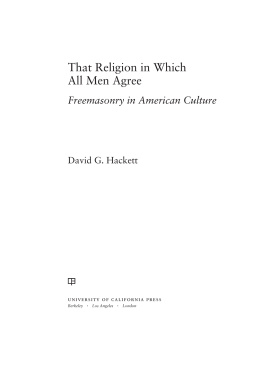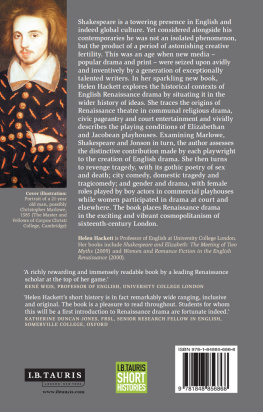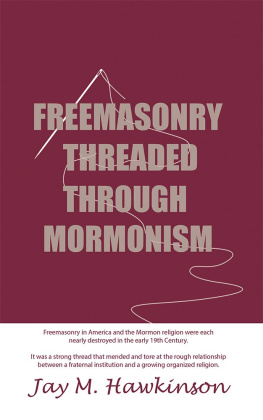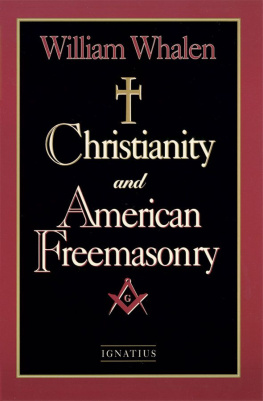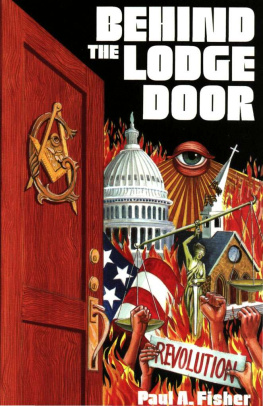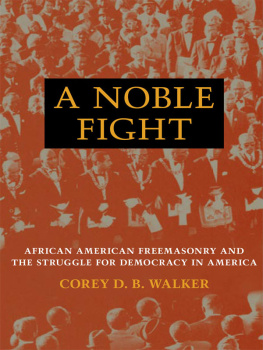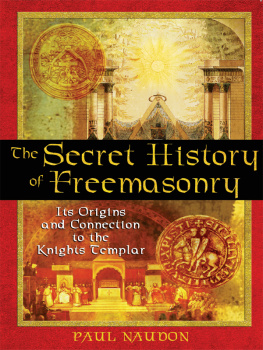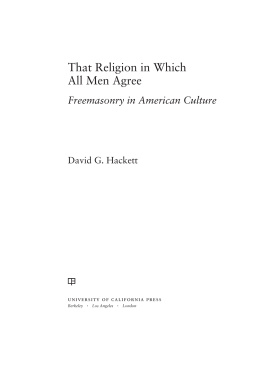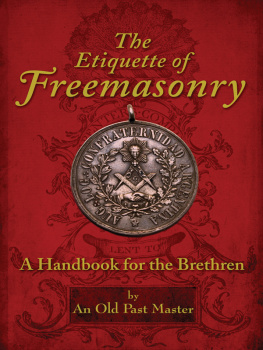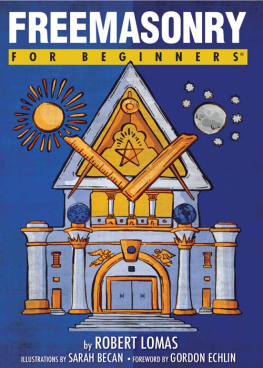
That Religion in Which All Men Agree
The publisher gratefully acknowledges the generous support of the Ahmanson Foundation Humanities Endowment Fund of the University of California Press Foundation.
That Religion in Which
All Men Agree
Freemasonry in American Culture
David G. Hackett

UNIVERSITY OF CALIFORNIA PRESS
BerkeleyLos AngelesLondon
University of California Press, one of the most distinguished university presses in the United States, enriches lives around the world by advancing scholarship in the humanities, social sciences, and natural sciences. Its activities are supported by the UC Press Foundation and by philanthropic contributions from individuals and institutions. For more information, visit www.ucpress.edu.
University of California Press
Berkeley and Los Angeles, California
University of California Press, Ltd.
London, England
2014 by The Regents of the University of California
Library of Congress Cataloging-in-Publication Data
Hackett, David G.
That Religion in Which All Men Agree : freemasonry in American culture / David G. Hackett.
p.cm.
Includes index.
ISBN 978-0-520-28167-7 (cloth, alk. paper)
ISBN 978-0-520-95762-6 (electronic)
1. FreemasonsUnited StatesHistory.2. FreemasonryUnited StatesHistory.3. Group identityUnited StatesHistory.4. United StatesReligionHistory.5. United StatesSocial life and customs.I. Title.
HS515.R452014
366.10973dc232013025218
Manufactured in the United States of America
21 20 19 18 17 16 15 14 13 14
10 9 8 7 6 5 4 3 2 1
In keeping with a commitment to support environmentally responsible and sustainable printing practices, UC Press has printed this book on Natures Natural, a fiber that contains 30% post-consumer waste and meets the minimum requirements of ANSI/NISO Z 39.48-1992 ( R 1997) ( Permanence of Paper ).
For Evie and Ben
Contents
Acknowledgments
Where are the men? I asked myself some years ago, while studying the membership lists of Albany, New Yorks early nineteenth-century churches. In 1830, 74 percent of that towns male work force did not belong to a church, and 72 percent of the members of its churches were women. City directory lists of Masonic lodges and their officers suggested themselves to me as holding possible answers.
I initially read my way into the literature on Freemasonry while looking for the existence of a male world that might broadly complement the Protestant womens sphere. As my research progressed, I saw larger implications. The fraternitys legendary history and ceremonial practices were part of a larger supernatural world inhabited by colonial men and women. Revolutionary-era Christian, republican Freemasonry had an influence on the creation of the United States that rivaled that of Protestantism. The brotherhoods private ceremonies were centrally involved in changing understandings of the body and sensory experience. Moreover, at different times Masonic beliefs and practices paralleled, interacted with, and diverged from not only white, mainstream Protestantism but also the black church, Native American world views, and immigrant Jewish and Catholic communal understandings. Though not a religion to its adherents, Freemasonry played a considerable role in the American religious past.
For assistance in my journey through Freemasonry, I thank the librarians and archivists who directed me to many of the materials for this book. The libraries of the Grand Lodges of Massachusetts, New York, Philadelphia, and Iowa were essential to this work. I am especially grateful to the librarian Bill Kreuger, who helped me find my way through the Prince Hall manuscripts at the Iowa Grand Lodge library in Cedar Rapids. Research visits to the American Antiquarian Society, the New York State Archives, the Schomburg Center for Research in Black Culture at the New York Public Library, the archives of Salisbury College in North Carolina, the First Congregational Church in Bedford, Massachusetts, and the Masonic Temple in Albany, New York, all provided needed materials. The Interlibrary Loan staff at the University of Florida, especially Janice Kahler, has always gone the extra mile in pursuing elusive materials.
I am grateful as well to a variety of sources for supporting this project. A National Endowment for the Humanities Fellowship and sabbatical homes provided by Princeton Theological Seminarys Center of Theological Inquiry and Princeton Universitys Center for the Study of Religion in America enabled the initial research. Daniel Hardy at the seminary and Robert Wuthnow at the university were gracious hosts. The Louisville Institute for the Study of American Protestantism supported a later year of research, which the Institute for Ecumenical and Cultural Research at Saint Johns University in Collegeville, Minnesota suffused with Benedictine spirituality. Here again I was gifted with warm and caring hosts, in Patrick Henry and Killian McDonnell. I am thankful to Wheaton Colleges Billy Graham Center for a travel grant to visit its collections and to my home university, the University of Florida, for providing summer support and research leaves.
I also thank the academic audiences who listened to and engaged with my evolving project in ways that made it better. The residents at the Center of Theological Inquiry and the fellows and graduate students of the Center for the Study of Religion in America discussed my early workshop papers. It was a stroke of luck to have Nancy Ammerman, Jim Bratt, Peter Paris, and Albert Raboteau among these conversation partners in my sabbatical year. I presented successive papers at the annual meetings of the International Society for the Sociology of Religion, the American Academy of Religion, the Canadian American Studies Association, the American Studies Association, the Organization of American Historians, the American Society of Church History, and the International Conference on Freemasonry. I am grateful too for invitations to discuss my work at Yale University, the University of Chicago, Harvard University, the University of Notre Dame, Drew University, Union Theological Seminary, the Center on Religion and Politics at Washington University, and the New York Grand Lodge of Free and Accepted Masons.
I have benefited from comments from and conversations with a number of colleagues and friends in addition to those already mentioned. Early on, Mark Carnes welcomed me into his home and shared his efforts to understand the burgeoning of late nineteenth-century fraternal orders. Cathy Albanese, Randy Balmer, and Mark Noll all offered advice and encouragement in the early stages. Laurie Maffly-Kipp and Grant Wacker provided important feedback on the initial draft of what became chapter 6, on the Prince Hall Masons. Fritz Detwiler, Joel Martin, Patrick Minges, and Joy Porter weighed in on chapter 7, on Native Americans. Jonathan Sarna and Daniel Soyer provided feedback on Jews and Freemasonry, while Chris Kaufman advanced my understanding of the Catholic Knights of Columbus (see chapter 8). Cathy Brekus, Jessica Harland-Jacobs, Paul Harvey, and Bob Wuthnow read whole drafts of the manuscript and offered constructive guidance. Within the Masonic fraternity, Mark Tabbert, the curator of the Masonic collections at the Scottish Rite Masonic Museum and Library, and especially S. Brent Morris, the editor of the Scottish Rite Journal , provided close readings of the penultimate draft. I am particularly indebted to Tony Fels for discussions of late nineteenth-century Freemasonry. Finally, it is a grace to have within the field of American religious studies good friends and colleagues who have offered words of encouragement as my research went down many a winding road. Beyond those already mentioned, Marie Griffith, Sam Hill, Brooks Holifield, Bob Orsi, Leigh Schmidt, Steve Tipton, and Tom Tweed have all rooted for this project, and I thank them for their support.
Next page
